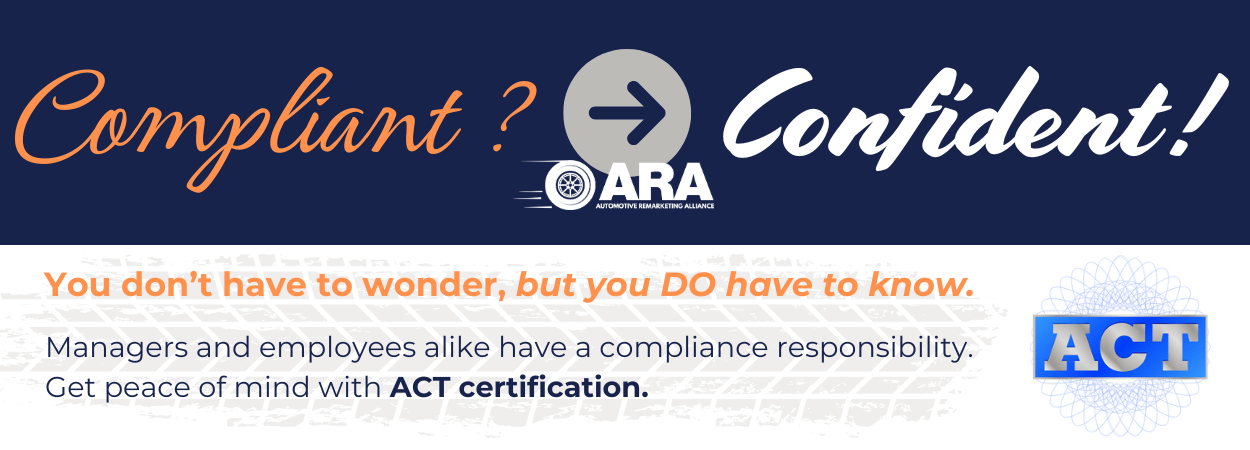Audit & Compliance Training (ACT)
Program Overview
Management
Complying with legal and regulatory requirements in the wholesale automotive remarketing industry is an obligation of everyone. Consignors, physical auctions and online auction platforms, dealers, and vendors to the industry all are subject to legal and regulatory requirements imposed by federal, state and local laws and regulations.
Understanding the compliance requirements imposed on your business by legal authorities and customers and taking precautions to remain compliant avoids financial and reputational harm to every business that operates in the remarketing industry. Proper knowledge, policies and practices help to establish a compliant organization, and on-going training fosters an atmosphere of compliance among your organization‘s employees.
The following Industry Standards for Privacy and Customer Compliance modules will explain the various information and privacy compliance obligations in the industry and help you become familiar with them. Through an explanation of the requirements and company best practices, you will gain the knowledge necessary to avoid compliance violations.
Throughout the training, you will find a common theme: Protecting Consumers and safeguarding customer data is the focus of compliance. Awareness is key.
Records and documents that contain PII or other proprietary information stored in offices, in file cabinets, on computer servers, or on portable laptop computers need to be protected from access by unauthorized individuals. In addition, appropriate protections need to be implemented to protect computer systems from physical access and destruction.
Proper policies and procedures adopted, implemented, and well known to employees, contractors and vendors are critical to ensuring protection of a company‘s physical and environmental security. Each person working in the industry has a role in protecting PII.
Protection of sensitive and personally identifiable information requires a compliance and security culture. Adoption of information security policies and adequate security in company IT systems will help ensure protection of the confidentiality, integrity and accessibility of information.
Developing and documenting your company‘s business continuity plan provides the road map for responding to disasters. Development of a business continuity plan includes four steps:
- Conduct a business impact analysis to identify time-sensitive or critical business functions and processes and the resources that support them.
- Organize a business continuity team and compile a business continuity plan to manage a business disruption.
- Identify, document and implement a plan to recover critical business functions and processes.
- Conduct training for the business continuity team and testing and exercises to evaluate recovery strategies and the plan.
Appropriate written policies applicable to confidentiality of business and customer information, use of technology resources, social media, anti-harassment, Red Flags, conflict of interest, and maintaining a clean desk all help protect the auction and its customers from disclosure of sensitive information and legal claims.
Employee
This training focuses primarily on federal laws that regulate certain of commercial customers in the remarketing industry. Financial institutions are highly regulated, and while the services your company provides as a remarketing company may not fall into the lending category, it is imperative that your company provide services in a manner that enables clients to remain compliant.
Many remarketing customers are required to have programs in place to ensure their service providers are aware of legal regulations so providers can comply with any that flow down through them. Employee training on the regulations is part of the customer program and is required by many company clients.
Complying with legal and regulatory requirements in the wholesale automotive remarketing industry is an obligation of everyone. Consignors, physical auctions and online auction platforms, dealers, and vendors to the industry all are subject to legal and regulatory requirements imposed by federal, state and local laws and regulations.
- Requirement to Protect Personally Identifiable Information (PII)
- Protection of Consumer Rights and Consumer Financial Information
- Active-Duty Military
- Protecting Against Unfair, Deceptive or Abusive Acts and Practices
- Preventing Identity Theft
In order to promote physical security, this Module will discuss:
- Protecting Against Physical Access
- Perimeter Security
- Facilities Security
- Building Security; Restricted Areas
- Clean Desk/Clear Screen
- Items Left in Vehicles
This Module will explain ways to ensure protection of information and data to avoid unlawful disclosure:
- Passwords
- Appropriate Use
- Authorized Software
- Mobile Devices and Security
- Wireless Communication
- Remote Access
- Removable Media
- Social Media
- Records Management and Destruction
- Social Engineering
- Information Classification
- Incident Response
Your company’s commitment to fair dealings with all customers upholds the integrity of the remarketing process.
This Module addresses the following ethical considerations:
- Code of Ethics
- Anti-Discrimination/Harassment
- Improper Payments and Conflicts of Interest

